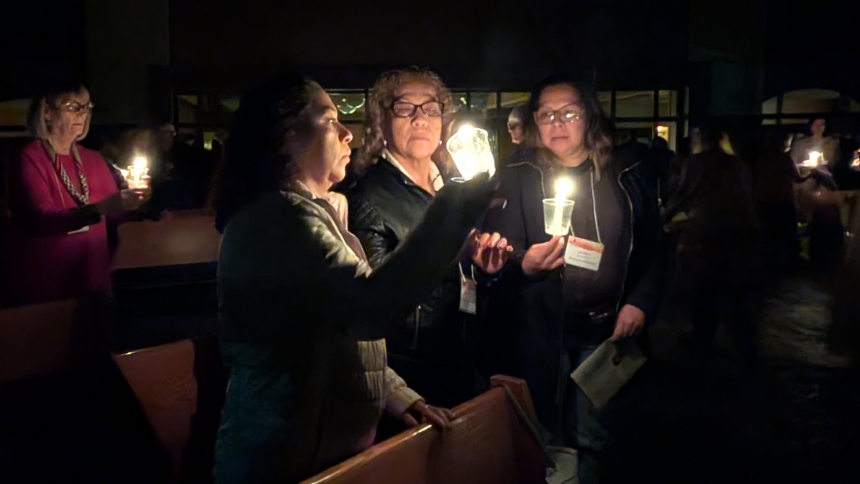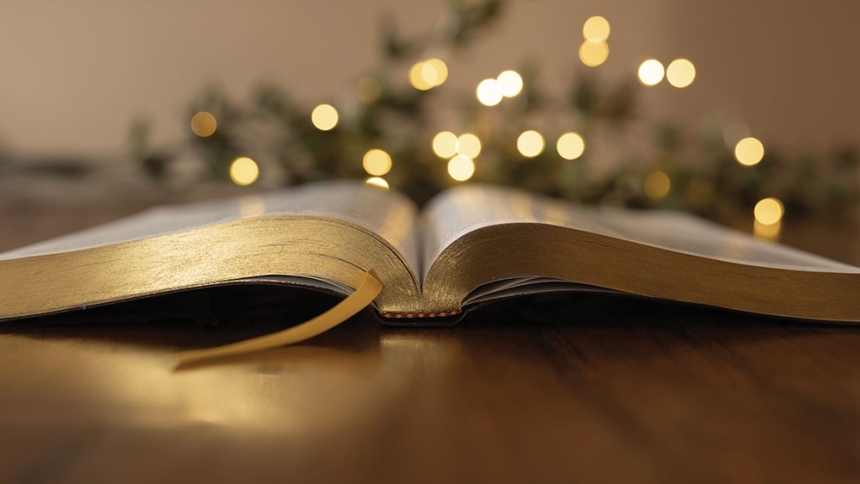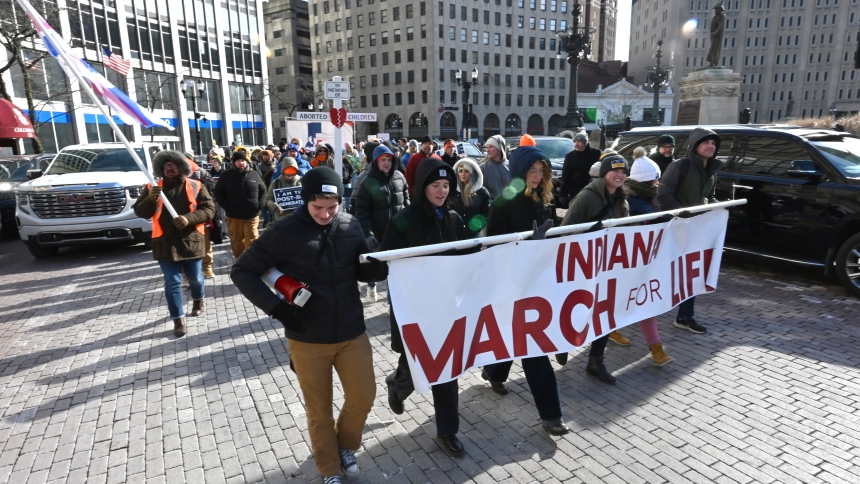
SCHERERVILLE – The glow of candles filled the dimly lit church of St. Michael the Archangel on Nov. 14 as lectors, extraordinary ministers of Holy Communion, those involved with the Order of Christian Initiation of Adults and others gathered for a Night Prayer with Service of Light. The service, known as Lucerarium, symbolizes the light of Christ overcoming darkness and ended the first night of Conference ‘25.
This year’s liturgical conference, organized by the Diocese of Gary, which took place at the end of the Catholic Church’s Year of Hope, focused on the nourishment of hope that comes through God’s Word and the sacraments.
Keynote speaker, Steven Janco, M.C.M, D.MIN, stated that when Catholics celebrate the liturgy or the sacraments, they tend to focus on the fact that they're receiving graces from the sacrament. He said while it's normal to reflect on the graces someone might receive from baptism or marriage, he pointed out that Pope Francis offered a different perspective in which to reflect on the sacraments in his letter on the liturgy called "Desiderio desideravi."
“Pope Francis said we encounter the Risen Christ. We don't come to get something, we come to meet someone,” he said. “And in the liturgy, when we celebrate the Eucharist, Christ is not inviting us to kneel and to adore him from a distance. We have a liturgy in which we kneel in awe and wonder in the Lord's presence. But in the celebration of Eucharist, Christ invites us to draw close.”
Janco said it is important for liturgical ministers to consider how they are inviting people to an encounter with the Risen Christ.
“Pope Francis says, when Jesus said ‘I have desired to celebrate this supper with you,’ he was saying that to all of us, to people of every generation,” he said. “Christ desires us, longs for us, to be one with him. That’s pretty amazing.”
Janco talked about the communion of saints, referencing that the Catholic Church recently celebrated All Souls Day and All Saints Day at the beginning of November. He noted that whenever the faithful celebrate the holy men and women who have gone before them or their loved ones or friends who have gone before them, they are expressing a profound faith in the communion of saints and in the resurrection.
“We believe that all the ties of friendship and affection that knit us as one throughout our lives do not unravel with death,” he said. Those ties remain.”
So how are Catholics supposed to live sacramentally? Janco explained that the seven sacraments are ritual moments when the Church says it is guaranteed that Christ is present when celebrated. He shared that in the early Church, lots of things were thought to be sacramental, but today the Church further defines some things as sacramentals, like rosaries and holy water. They aren't sacraments, but are sacramental, having the power to remind the faithful of God's presence.
“We're not simply saying there are holy things in the world,” Janco said. “We are saying that a holy God is present in the world again, not a holy thing, but the divine presence of a person of a God that we have a relationship with, not just one that we look at from a distance.”
William Becerra, D.MIN, offered the Spanish keynote, focusing on how Latino faith communities naturally live a sacramental worldview where daily life, family experience, and community relationships serve as the first place of encounter with the Risen Christ. He explained that the sacraments do not create holiness, but rather reveal and strengthen the holiness already cultivated within the lived experience of the People of God.
“La liturgia no es un paréntesis sagrado que suspende la vida, es la proclamación de que Dios ya está actuando en la vida real,” he noted. “We are not teaching people to live sacramentally – many already do. Our task is to help them name what God is doing, bless it, and walk with them.”
Becerra invited ministers to rediscover the profound connection between faith, culture and daily life, emphasizing that the liturgy must illuminate realities already alive in the people. He shared that the sacraments are not designed to replace life, but rather to recognize, dignify, and bless the sacred already present in families and communities.
“La Eucaristía no comienza en el altar — comienza en la mesa de tu casa,” Becerra said. “When the Church celebrates sacraments, she is not importing holiness from heaven; she is naming and strengthening what God is already doing among His people.”
During the conference, participants spent most of the second day in smaller group training sessions based on their roles within their parishes, in order for specific presenters to provide more direct information to music ministers, ministers of care, sacristans and more.
Andy Sporner of Holy Family in LaPorte was encouraged to attend as a student in the diocesan Lay Ministry program. As a Eucharistic minister he wanted to extend his religious training through the conference. What he enjoyed most about the event was the diversity of the music program throughout the conference.
“To experience Mass was just really out of this world,” he said. “It just really brought me closer to God, especially at a time that I needed it. I found it was just really a very nice communal experience.”
Leonora Bujna, currently a Eucharistic minister at Our Lady of Grace in Highland, attended for a renewal in her ministry. She commented that she has learned a lot of new things since becoming a Eucharistic minister and said attending the conference gave her an opportunity to gain more knowledge and meet more people.
“It's very interesting,” she said. “There's a lot of people here who want to serve the Church, and that makes me happy.”
Even though Bujna is far away from her relatives who live in another country, she feels blessed to have her church. She finds happiness in assisting at Mass and giving back to her parish community. She explained that when she gives of her time, she doesn’t expect to get anything back in return, a philosophy she learned from her mother.
“When you're in the church and at a gathering like this, it opens your mind,” she said. “You feel like the Holy Spirit is close. If I didn’t have God, I would be so lost. I wouldn’t know what to do.”
Raquel Martinez, of Our Lady of Guadalupe in East Chicago, who had attended the diocesan liturgical conference before, came wanting to learn more about the positions that she has been volunteering in, serving as both a lector and sacristan at her parish.
“I want to make sure that I'm doing it right, and I know that there's so much to learn,” she said.
Martinez understands that every church operates differently, so she wanted to use the conference as a time to reflect on what she is doing and isn’t doing in her roles, and perhaps see what she can do better.
“I want to know how I can do what I'm doing the right way and to fill myself up spiritually,” she said. “I want to do it with more joy, more like how I did when I first started, with the same enthusiasm as before.”


